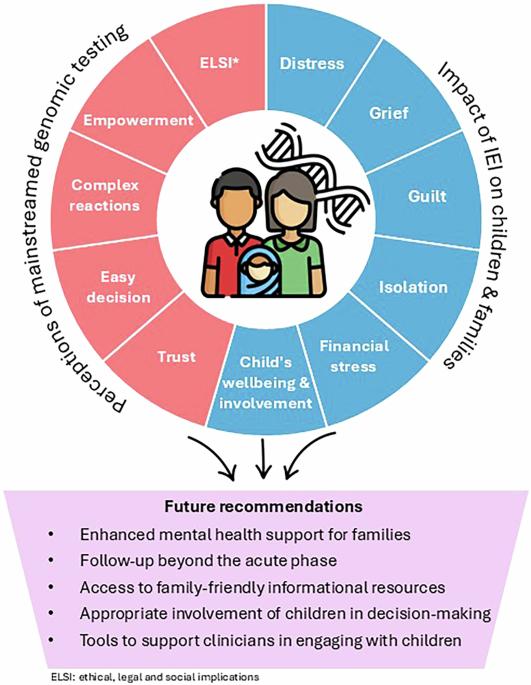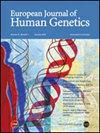“It’s a Godsend”: Parental experiences of genomic testing for paediatric inborn errors of immunity
IF 4.6
2区 生物学
Q2 BIOCHEMISTRY & MOLECULAR BIOLOGY
引用次数: 0
Abstract
Genomic testing has become essential to diagnosing and managing paediatric inborn errors of immunity (IEI), necessitating the development of mainstream models of care to facilitate optimal delivery of testing. However, little is known about the experiences of families undergoing paediatric IEI genomic testing within mainstream settings and parental experiences with such conditions remain underexplored. Thus, this study aimed to describe the experiences of parents of children who underwent mainstreamed IEI genomic testing. Semi-structured interviews were conducted with 17 parents (14 mothers and 3 fathers) of children with an IEI and thematically analysed. Six themes captured (i) the diverse dimensions of distress related to paediatric IEI, (ii) the associated social, practical and financial implications, (iii) the involvement of children in their care, (iv) parental satisfaction with mainstreamed genomic testing, (v) the value of multidisciplinary care, and (vi) considerations surrounding genomic testing decision-making. Findings highlight the significant psychosocial impacts of paediatric IEI, including distinct social and emotional challenges. High satisfaction with mainstreamed IEI genomic testing was reported by all parents. Recommendations for improvement include developing tailored resources to address families ongoing psychoeducational needs, enhancing mental health support, and involving children appropriately. Collectively, these findings substantiate the benefits of mainstreamed IEI genomic testing, while expanding literature on the psychosocial impact of such paediatric conditions. Further exploration of families and children’s needs and development of tailored resources are essential to ensure the delivery of patient-centred care.

“这是天赐之物”:父母对儿童先天性免疫缺陷的基因组检测经验。
基因组检测已成为诊断和管理儿科先天性免疫错误的关键,因此有必要开发主流护理模式,以促进最佳检测的提供。然而,在主流环境中对接受儿科IEI基因组检测的家庭的经历知之甚少,而父母在这种情况下的经历仍未得到充分探索。因此,本研究旨在描述接受主流IEI基因组检测的儿童父母的经历。采用半结构化访谈法对17位具有IEI儿童的父母(14位母亲和3位父亲)进行访谈,并进行主题分析。六个主题涵盖了(i)与儿童IEI相关的痛苦的不同方面,(ii)相关的社会、实际和经济影响,(iii)儿童参与他们的照顾,(iv)父母对主流基因组检测的满意度,(v)多学科护理的价值,以及(vi)围绕基因组检测决策的考虑。研究结果强调了儿科IEI的重大社会心理影响,包括独特的社会和情感挑战。所有家长都对主流的IEI基因组检测表示高度满意。改进的建议包括开发有针对性的资源,以满足家庭持续的心理教育需求,加强心理健康支持,并使儿童适当参与。总的来说,这些发现证实了主流IEI基因组检测的好处,同时扩大了关于此类儿科疾病的社会心理影响的文献。为确保提供以病人为中心的护理,必须进一步探讨家庭和儿童的需要,并开发有针对性的资源。
本文章由计算机程序翻译,如有差异,请以英文原文为准。
求助全文
约1分钟内获得全文
求助全文
来源期刊

European Journal of Human Genetics
生物-生化与分子生物学
CiteScore
9.90
自引率
5.80%
发文量
216
审稿时长
2 months
期刊介绍:
The European Journal of Human Genetics is the official journal of the European Society of Human Genetics, publishing high-quality, original research papers, short reports and reviews in the rapidly expanding field of human genetics and genomics. It covers molecular, clinical and cytogenetics, interfacing between advanced biomedical research and the clinician, and bridging the great diversity of facilities, resources and viewpoints in the genetics community.
Key areas include:
-Monogenic and multifactorial disorders
-Development and malformation
-Hereditary cancer
-Medical Genomics
-Gene mapping and functional studies
-Genotype-phenotype correlations
-Genetic variation and genome diversity
-Statistical and computational genetics
-Bioinformatics
-Advances in diagnostics
-Therapy and prevention
-Animal models
-Genetic services
-Community genetics
 求助内容:
求助内容: 应助结果提醒方式:
应助结果提醒方式:


